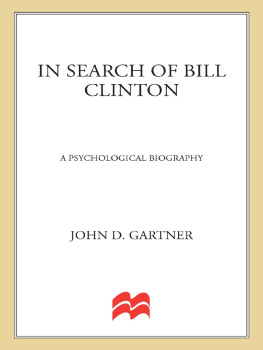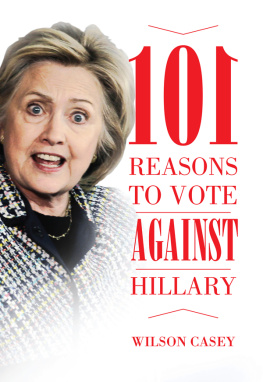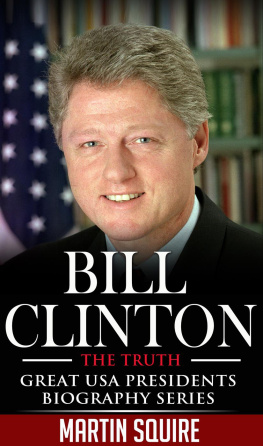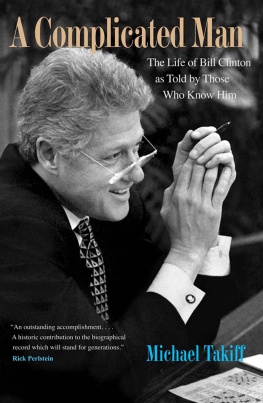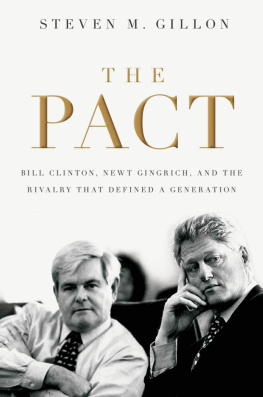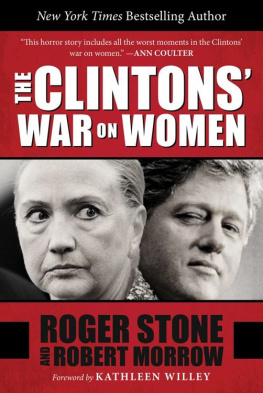H OURS BEFORE HE WOULD HAND OVER THE WHITE House to George W. Bush, Bill Clinton was pulling an all-nighter. He was known for sleeping only a few hours a night even during the calmest of times, but this evening, he was outdoing himself.
He would most certainly have run for the presidency againif it werent for the constitutional ban on third termsand even after the Monica Lewinsky scandal and the humiliating impeachment, he would have won. Even Republicans who wondered how such a brilliant, empathetic man could be so lacking in basic morality understood that, as president, William Jefferson Clinton had shown just how good he could be. As president, he had eliminated the deficit, coaxed through welfare reform, and presided over years of peace and prosperity.
Jim Guy Tucker, who had competed with Clinton in Arkansas politics (usually landing on the losing side), succeeded him as governor of the state but ended up in prison, tangled in the Clinton-era Whitewater scandal. Nonetheless, Tucker recognizes that Clinton tops the pyramid
Mark Buell, a wealthy San Francisco businessman and generous supporter of Democrats in general and Bill and Hillary Clinton in particular, remembers the president, then in his second term, giving him and his wife, Susie Tompkins Buell, a Sunday-morning tour of the Oval Office. I love being president, Clinton said. I could be president twenty-nine more years.
In 1999, Bill Clinton grew wistful at the prospect of moving on: I confess that I love the job, even on the worst days. By then, more than a year after the Lewinsky scandal turned the president of the United States into a dirty joke on late-night television, there were plenty of bad days.
It was very hard for him to let go, says Melanne Verveer, First Lady Hillary Clintons last chief of staff. He loved being president. He loved the house. He loved his relationship with the American people. He did not leave easily.
Clinton needed to savor the remaining hours, pride mixed with regret mixed with brooding over the beating his reputation had taken after he admitted that, yes, he did have sex with that woman, Ms. Lewinsky, and not only that, he had it just steps from the Oval Office. He was obsessed with framing the historic impeachment that followed as a badge of honorthe right-wingers tried to force him out of office and he had held his ground and would serve until the last minute of the last day of his last term.
As happens at the close of every administrationClinton being Clinton it was happening closer to the close of hishe was wrestling with the question of pardons and who should get them.
That afternoon of January 19, Salt Lake City mayor Rocky Anderson was in Washington for the U.S. Conference of Mayors meeting. Anderson
President Clinton met with the mayors, and, during the photo op, as Anderson and Clinton were shaking hands, a hundred mayors behind him waiting for their photograph with the president, I took that opportunity, Anderson recalls, to remind President Clinton that we had put in for this pardon and really appreciated his personal attention to it. Anderson knew this was Stringfellows last chance.
The pardon power, granted to the president in Article II of the Constitution, is subject to no ones review, not the Congress, not the courts. Clinton could have pardonedor commuted the sentence ofa serial killer if he so chose. The framers recognized that there would be political repercussions for a chief executive who granted pardons that offended public opinion.
Anderson wasnt the only one trying to catch Clintons attention that last day in the White House.
This was not the first time Jack Quinn had lobbied Clinton. During Clintons last weeks in office, the lawyer/lobbyist plied the president with entreaties and documents. Recognizing that the window of opportunity was closing, Quinn wrote Clinton a letter dated January 5, 2001.
Rich had other advocates who were contacting the president, including Clintons friend, then Israeli prime minister Ehud Barak, who, says Quinn, had appealed to him on not less than three occasions, probably four, to do this.
The press had been promised the pardon list, but its release time was repeatedly delayed, beyond the last announced time of 9:15 P.M.
Earlier that last night, at an event in the Indian Treaty Room commemorating all of Clintons health-care achievements, Senator Ted Kennedy gave the president a hand-autographed first edition of Profiles in Courage, by Kennedys brother and Clintons hero, John Kennedy. Ted Kennedy broke down and cried, recalls Chris Jennings, a senior health adviser in the Clinton White House.
The president watched with Hillary part of a David Mamet movie, State and Main; he talked to friends on the telephone; he asked one of them, his master money raiser and hand-holder, Terry McAuliffe, to come over for a final White House visit. McAuliffe ended up spending the night, the two talking as Clinton packed his books to be shipped to Chappaqua, his new home in suburban New York. Hollywood producer Harry Thomason, who with his wife, Linda Bloodworth-Thomason, helped the president stage his response to the Lewinsky scandal, also slept over.
With only hours remaining before his administration ended, the list of 140 pardons and commutations was finally released. On it was a pardon for his younger half brother, Roger, who had pleaded guilty in 1985 to conspiring to distribute cocaine.
The president, friends say, was teary eyed that night, by turns anticipating his new lifeHillary would be taking her place as the junior senator from New York and Bill would be moving to Chappaquaand dreading it. He was, in those final hours, replaying the highs and lows of his tenure, believing one moment that he had been a great president and would be so recognized by historians, but in darker moments understanding that impeachment would always mar his standing.
BILL CLINTON is a hedonist, a risk taker who does not worry much about consequences; one of his friends calls him, with sadness in his voice, narcissistic and reckless.
The nightmare was amplified because the relationship between the baby-boomer southerners, Clinton and Gore, had been so complementary. Before Dick Cheney, says Melanne Verveer, Al Gore had more power and more to do as vice president than any of his predecessors.
After Lewinsky, Gore went through the motions of being vice president, but he shifted his attention to running for president, barely mentioning Clinton as he campaigned, and, with very few exceptions, sidelining Clinton.
So long as Tony Coelho, a close Clinton friend, headed Gores campaignClintons Commerce secretary, Bill Daley, replaced Coelho in June 2000he and Clinton, behind the scenes, talked strategy, two or three times a week, sometimes in the White House. Some in the Gore camp, Coelho says, believed Clinton was a saboteur who secretly wanted Bush to win and to serve eight years. Cheney was too unhealthy to run for president; Hillary would win the Senate seat, run for reelection to prove herself, and then run for president in 2008. When Gore lost, Coelho says, these people felt that outcome was Clintons wish all along. In an interview with Tim Russert, Sally Bedell Smith, author of a book on Bill and Hillarys relationship in the White House, mentioned that early in Bills first term, the new president mused about eight years of Hillary following his eight years; i.e., he was playing with the notion of Hillary, not Al, as his successor.


